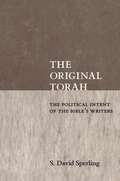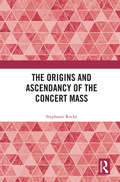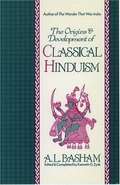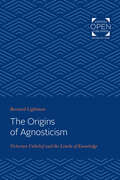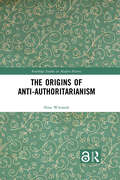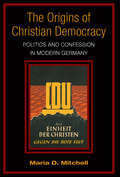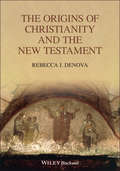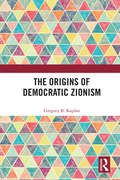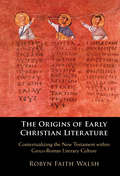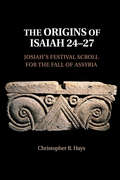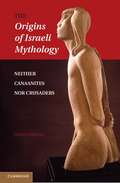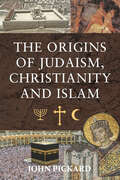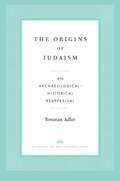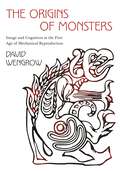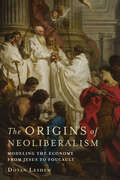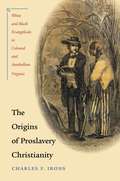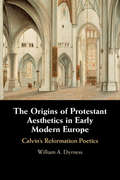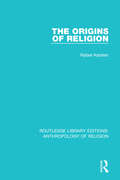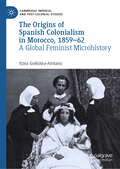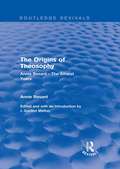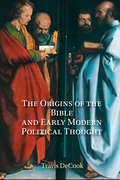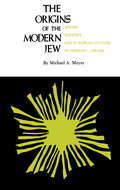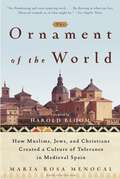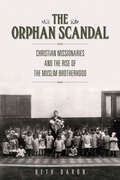- Table View
- List View
The Original Torah: The Political Intent of the Bible's Writers (Reappraisals in Jewish Social History)
by S. David SperlingIs the Torah true? Do the five books of Moses provide an accurate historical account of the people of ancient Israel’s origins? In The Original Torah, S. David Sperling argues that, while there is no archeological evidence to support much of the activity chronicled in the Torah, a historical reality exists there if we know how to seek it. By noting the use of foreign words or mentions of technological innovations scholars can often pinpoint the date and place in which a text was written. Sperling examines the stories of the Torah against their historical and geographic backgrounds and arrives at a new conclusion: the tales of the Torah were originally composed as allegories whose purpose was distinctly and intentionally political. The book illustrates how the authors of the Pentateuch advanced their political and religious agenda by attributing deeds of historical figures like Jeroboam and David to ancient allegorical characters like Abraham and Jacob. If “Abraham“ had made peace with Philistines, for example, then David could rely on a precedent to do likewise. The Original Torah provides a new interpretive key to the foundational document of both Judaism and Christianity.
The Origins and Ascendancy of the Concert Mass
by Stephanie RockeThe mass is an extraordinary musical form. Whereas other Western art music genres from medieval times have fallen out of favour, the mass has not merely survived but flourished. A variety of historical forces within religious, secular, and musical arenas saw the mass expand well beyond its origins as a cycle of medieval chants, become concertised and ultimately bifurcate. Even as Western societies moved away from their Christian origins to become the religiously plural and politically secular societies of today, and the Church itself moved in favour of congregational singing, composers continued to compose masses. By the early twentieth century two forms of mass existed: the liturgical mass composed for church services, and the concert mass composed for secular venues. Spanning two millennia, The Origins and Ascendancy of the Concert Mass outlines the origins and meanings of the liturgical texts, defines the concert mass, explains how and why the split occurred, and provides examples that demonstrate composers’ gradual appropriation of the genre as a vehicle for personal expression on serious issues. By the end of the twentieth century the concert mass had become a repository for an eclectic range of theological and political ideas.
The Origins and Development of Classical Hinduism
by A. L. Basham Kenneth G. ZyskThe late A.L. Basham was one of the world's foremost authorities on ancient Indian culture and religion. Modeled on his monumental work The Wonder That Was India, this account of the origins and development of classical Hinduism represents a lifetime of reflection on the subject, and offers an intriguing introduction to one of the richest of all Asian traditions. <p><p> Synthesizing Basham's great knowledge of the art, architecture, literature, and religion of South Asia, this concise history traces the spiritual life of India from the time of the Indus Culture (around 2700 B.C.E) through the crystallization of classical Hinduism in the first centuries of the common era. It chronicles as well the rise of other mystical and ascetic traditions, such as Buddhism and Jainism, and follows Hinduism's later incarnations in the West, making it an especially comprehensive introduction to the subject. <p> Unlike Christianity or Islam, Hinduism was not inspired by single great prophet but rather evolved organically. The wide range of influences and sources--along with the great number of sacred texts in ancient languages--can make the Hindu system of faith and practice seem almost impenetrable to the uninitiated. With its vivid presentation of Hinduism's sources--from the warrior Aryans to the wandering ascetics--and its clearly written explanations and analyses of the major Hindu texts--among them the Rg-veda, the Brahmanas, Upanishads, and the Mahabharata and Ramayana--The Origins of Classical Hinduism clarifies much of Hinduism's enduring mystique. With an especially helpful bibliography, numerous illustrations of Hindu art never before published, and a lucid, accessible style, this book is must reading for anyone who has ever been intrigued by this fascinating religion.
The Origins of Agnosticism: Victorian Unbelief and the Limits of Knowledge
by Bernard LightmanOriginally published in 1987. The Origins of Agnosticism provides a reinterpretation of agnosticism and its relationship to science. Professor Lightman examines the epistemological basis of agnostics' learned ignorance, studying their core claim that "God is unknowable." To address this question, he reconstructs the theory of knowledge posited by Thomas Henry Huxley and his network of agnostics. In doing so, Lightman argues that agnosticism was constructed on an epistemological foundation laid by Christian thought. In addition to undermining the continuity in the intellectual history of religious thought, Lightman exposes the religious origins of agnosticism.
The Origins of Anti-Authoritarianism (Routledge Studies in Modern History)
by Nina WitoszekThis book discusses the ongoing revolution of dignity in human history as the work of ‘humanist outliers’: small groups and individuals dedicated to compassionate social emancipation. It argues that anti-authoritarian revolutions like 1989’s ‘Autumn of the Nations’ succeeded in large part due to cultural and political innovations springing from such small groups. The author explores the often ingenious ways in which these maladapted and liminal ‘outliers’ forged a cooperative and dialogic mindset among previously resentful and divided communities. Their strategies warrant closer scrutiny in the context of the ongoing 21st century revolution of dignity and efforts to (re)unite an ever more troubled and divided world.
The Origins of Christian Democracy: Politics and Confession in Modern Germany
by Mitchell Maria D.This book is a pioneering contribution to the history of the founding of the West German political system after the Second World War. The political cooperation between Catholics and Protestants that resulted in the formation of the Christian Democratic Union (CDU) in occupied and early West Germany represented a significant change from a long history of hostility in confessional relations. Given that the CDU went on to dominate politics in West Germany well into the 1960s, Maria D. Mitchell argues that an understanding of what made this interconfessional party possible is crucial to an exploration of German history in the postwar period. She examines the political history of party formation as well as the religious beliefs and motivations that shaped the party's philosophy and positions. She provides an authoritative guide to the complex processes of maneuvering and negotiation that produced the CDU during 1945-46. The full range of political possibilities is discussed, including the suppressed alternatives to the Adenauer/Erhard axis that eventually defined the party's trajectory during the 1950s and the abortive Christian Socialism associated with Jacob Kaiser.
The Origins of Christianity and the New Testament (Blackwell Ancient Religions)
by Rebecca I. DenovaIn The Origins of Christianity and the New Testament, distinguished scholar Rebecca I. Denova explores how the first followers of Jesus arrived at their faith, the way their sacred texts developed into the New Testament, and how their movement eventually became the religion of Christianity. This accessible volume examines the concepts, beliefs, issues, and events that gave rise to institutional Christianity—providing readers with the historical context of the gospels of Mark, Matthew, Luke, and John, the Acts of the Apostles, the Book of Revelation, the letters of Paul, and other foundational New Testament documents.Approaching the subject from the multidisciplinary perspective of Religious Studies, the author addresses topics including the ethnic and religious background of “Jesus the Jew,” the New Testament’s different portraits of Jesus, the genesis of Christian concepts such as the divine incarnation and “second coming” of Jesus, Paul the Apostle’s contributions to Christian dogma, how ancient Judaism, Greco-Roman culture, and early philosophy was incorporated into the Christian tradition, and more.Containing maps, timelines, figures of archaeological sites, a brief history of ancient Judaism, and a wealth of pedagogical features, The Origins of Christianity and the New Testament is an excellent textbook for all undergraduate and graduate courses in the study of ancient Christianity, as well as lay readers with interest in tracing the roots of the Christian faith.
The Origins of Democratic Zionism
by Gregory B. KaplanThis book is the first to link the modern appreciation for democratic freedom directly to Jewish political thought in seventeenth-century Amsterdam. The modern appreciation for democratic values is often assumed to have its roots in Classical thought. However, democracy has taken various forms in its progression to the governance many countries now employ. Working in dialog with Protestants, Jewish thinkers voiced the first Modern appeal for the reestablishment of a Jewish polity in the Holy Land. This appeal was grounded in a vision of a Jewish state governed by individual liberty and popular consent, which could be defined as a democratic Zionism. The book focuses on influential rabbi Saul Levi Morteira (b. ca. 1590-d. 1660), as well as two of the most renowned members of his congregation, Baruch Spinoza and Miguel de Barrios. Unlike contemporary Catholic and Protestant thinkers, these three intellectuals found democratic values in an Old Testament polity that came to be revered as the Hebrew Republic. The book explores the trajectory by which this democratization of the Hebrew Republic evolved in the writings of Morteira as an alternative to divine-right rule. It then shows that, in spite of their divergent views toward practicing Judaism, Spinoza and Barrios disseminated Morteira’s democratic ideas and promoted the Hebrew Republic as a model polity for a post-medieval political order. This book will be of great use to scholars of Judaism and Jewish philosophy in the modern era, medieval and early modern Spanish literature, as well as religious, political and intellectual history.
The Origins of Early Christian Literature: Contextualizing the New Testament within Greco-Roman Literary Culture
by Robyn Faith WalshConventional approaches to the Synoptic gospels argue that the gospel authors acted as literate spokespersons for their religious communities. Whether described as documenting intra-group 'oral traditions' or preserving the collective perspectives of their fellow Christ-followers, these writers are treated as something akin to the Romantic poet speaking for their Volk - a questionable framework inherited from nineteenth-century German Romanticism. In this book, Robyn Faith Walsh argues that the Synoptic gospels were written by elite cultural producers working within a dynamic cadre of literate specialists, including persons who may or may not have been professed Christians. Comparing a range of ancient literature, her ground-breaking study demonstrates that the gospels are creative works produced by educated elites interested in Judean teachings, practices, and paradoxographical subjects in the aftermath of the Jewish War and in dialogue with the literature of their age. Walsh's study thus bridges the artificial divide between research on the Synoptic gospels and Classics.
The Origins of Isaiah 24–27: Josiah's Festival Scroll for the Fall of Assyria
by Christopher B. HaysIsaiah 24-27 has been an enduring mystery and a hotly contested text for biblical scholars. Early scholarship linked its references to the dead rising to the New Testament. These theories have remained influential even as common opinion moderated over the course of the twentieth century. In this volume, Christopher B. Hays situates Isaiah 24-27 within its historical and cultural contexts. He methodically demonstrates that it is not apocalyptic; that its imagery of divine feasting and conquering death have ancient cognates; and that its Hebrew language does not reflect a late composition date. He also shows how the passage celebrates the receding of Assyrian power from Judah, and especially from the citadel at Ramat Rahel near Jerusalem, in the late seventh century. This was the time of King Josiah and his scribes, who saw a political opportunity and issued a peace overture to the former northern kingdom. Using comparative, archaeological, linguistic, and literary tools, Hays' volume changes the study of Isaiah, arguing for a different historical setting than that of traditional scholarship.
The Origins of Israeli Mythology
by David Maisel David OhanaIt is claimed that Zionism as a meta-narrative has been formed through contradiction to two alternative models, the Canaanite and crusader narratives. These narratives are the most daring and heretical assaults on Israeli-Jewish identity. The Israelis, according to the Canaanite narrative, are from this place and belong only here; according to the crusader narrative, they are from another place and belong there. The mythological construction of Zionism as a modern crusade describes Israel as a Western colonial enterprise planted in the heart of the East and alien to the area, its logic and its peoples. The nativist construction of Israel as neo-Canaanism demands breaking away from the chain of historical continuity. These are the greatest anxieties that Zionism and Israel needed to encounter and answer forcefully. The Origins of Israeli Mythology seeks to examine the intellectual archaeology of Israeli mythology, as it reveals itself through the Canaanite and crusader narratives.
The Origins of Judaism, Christianity and Islam
by John PickardThere has never been a more important time for a study of the social, economic and political origins of Judaism, Christianity and Islam, three important world religions which share a common root. This book takes as its starting point the idea that gods, angels, miracles and other supernatural phenomena do not exist in the real world and therefore cannot explain the origins of these faiths. It looks instead at the material conditions at appropriate periods in antiquity and the social and economic forces at work, and it examines the historicity of key figures like Moses, Jesus and Mohammed. This is a unique book which draws on the research, knowledge and expertise of hundreds of historians, archaeologists and scholars, to create a synthesis that is completely coherent and at the same time is based on real-world social conditions. It is a book by a non-believer for other non-believers, and it will be a revelatory read, even to those already of an atheist, agnostic or secularist persuasion.
The Origins of Judaism: An Archaeological-Historical Reappraisal (The Anchor Yale Bible Reference Library)
by Yonatan AdlerGroundbreaking research that utilizes archaeological discoveries and ancient texts to revolutionize our understanding of the beginnings of Judaism&“A bravura study.&”—Publishers Weekly (starred review) Throughout much of history, the Jewish way of life has been characterized by strict adherence to the practices and prohibitions legislated by the Torah: dietary laws, ritual purity, circumcision, Sabbath regulations, holidays, and more. But precisely when did this unique way of life first emerge, and why specifically at that time? In this revolutionary new study, Yonatan Adler methodically engages ancient texts and archaeological discoveries to reveal the earliest evidence of Torah observance among ordinary Judeans. He examines the species of animal bones in ancient rubbish heaps, the prevalence of purification pools and chalk vessels in Judean settlements, the dating of figural representations in decorative and functional arts, evidence of such practices as tefillin and mezuzot, and much more to reconstruct when ancient Judean society first adopted the Torah as authoritative law. Focusing on the lived experience of the earliest Torah observers, this investigative study transforms much of what we thought we knew about the genesis and early development of Judaism.
The Origins of Monsters: Image and Cognition in the First Age of Mechanical Reproduction (The Rostovtzeff Lectures #2)
by David WengrowIt has often been claimed that "monsters"--supernatural creatures with bodies composed from multiple species--play a significant part in the thought and imagery of all people from all times. The Origins of Monsters advances an alternative view. Composite figurations are intriguingly rare and isolated in the art of the prehistoric era. Instead it was with the rise of cities, elites, and cosmopolitan trade networks that "monsters" became widespread features of visual production in the ancient world. Showing how these fantastic images originated and how they were transmitted, David Wengrow identifies patterns in the records of human image-making and embarks on a search for connections between mind and culture. Wengrow asks: Can cognitive science explain the potency of such images? Does evolutionary psychology hold a key to understanding the transmission of symbols? How is our making and perception of images influenced by institutions and technologies? Wengrow considers the work of art in the first age of mechanical reproduction, which he locates in the Middle East, where urban life began. Comparing the development and spread of fantastic imagery across a range of prehistoric and ancient societies, including Mesopotamia, Egypt, Greece, and China, he explores how the visual imagination has been shaped by a complex mixture of historical and universal factors. Examining the reasons behind the dissemination of monstrous imagery in ancient states and empires, The Origins of Monsters sheds light on the relationship between culture and cognition.
The Origins of Neoliberalism: Modeling the Economy from Jesus to Foucault
by Dotan LeshemDotan Leshem recasts the history of the West from an economic perspective, bringing politics, philosophy, and the economy closer together and revealing the significant role of Christian theology in shaping economic and political thought. He begins with early Christian treatment of economic knowledge and the effect of this interaction on ancient politics and philosophy. He then follows the secularization of the economy in liberal and neoliberal theory.Leshem draws on Hannah Arendt's history of politics and Michel Foucault's genealogy of economy and philosophy. He consults exegetical and apologetic tracts, homilies and eulogies, manuals and correspondence, and Church canons and creeds to trace the influence of the economy on Christian orthodoxy. Only by relocating the origins of modernity in Late Antiquity, Leshem argues, can we confront the full effect of the neoliberal marketized economy on contemporary societies. Then, he proposes, a new political philosophy that re-secularizes the economy will take shape and transform the human condition.
The Origins of Organized Charity in Rabbinic Judaism
by Gregg E. GardnerThis book examines the origins of communal and institutional almsgiving in rabbinic Judaism. It undertakes a close reading of foundational rabbinic texts (Mishnah, Tosefta, Tannaitic Midrashim) and places their discourses on organized giving in their second to third century CE contexts. Gregg E. Gardner finds that Tannaim promoted giving through the soup kitchen (tamhui) and charity fund (quppa), which enabled anonymous and collective support for the poor. This protected the dignity of the poor and provided an alternative to begging, which benefited the community as a whole - poor and non-poor alike. By contrast, later Jewish and Christian writings (from the fourth to fifth centuries) would see organized charity as a means to promote their own religious authority. This book contributes to the study of Jews and Judaism, history of religions, biblical studies, and ethics.
The Origins of Proslavery Christianity
by Charles F. IronsIn the colonial and antebellum South, black and white evangelicals frequently prayed, sang, and worshipped together. Even though white evangelicals claimed spiritual fellowship with those of African descent, they nonetheless emerged as the most effective defenders of race-based slavery.As Charles Irons persuasively argues, white evangelicals' ideas about slavery grew directly out of their interactions with black evangelicals. Set in Virginia, the largest slaveholding state and the hearth of the southern evangelical movement, this book draws from church records, denominational newspapers, slave narratives, and private letters and diaries to illuminate the dynamic relationship between whites and blacks within the evangelical fold. Irons reveals that when whites theorized about their moral responsibilities toward slaves, they thought first of their relationships with bondmen in their own churches. Thus, African American evangelicals inadvertently shaped the nature of the proslavery argument. When they chose which churches to join, used the procedures set up for church discipline, rejected colonization, or built quasi-independent congregations, for example, black churchgoers spurred their white coreligionists to further develop the religious defense of slavery.
The Origins of Protestant Aesthetics in Early Modern Europe: Calvin's Reformation Poetics
by William A. DyrnessThe aesthetics of everyday life, as reflected in art museums and galleries throughout the western world, is the result of a profound shift in aesthetic perception that occurred during the Renaissance and Reformation. In this book, William A. Dyrness examines intellectual developments in late Medieval Europe, which turned attention away from a narrow range liturgical art and practices and towards a celebration of God's presence in creation and in history. Though threatened by the human tendency to self-assertion, he shows how a new focus on God's creative and recreative action in the world gave time and history a new seriousness, and engendered a broad spectrum of aesthetic potential. Focusing in particular on the writings of Luther and Calvin, Dyrness demonstrates how the reformers' conceptual and theological frameworks pertaining to the role of the arts influenced the rise of realistic theater, lyric poetry, landscape painting, and architecture in the sixteenth and seventeenth centuries.
The Origins of Religion: A Study In Primitive Religion (1905) (Routledge Library Editions: Anthropology of Religion #3)
by Rafael KarstenThis book, first published in 1935, collects together material on the origins of religion from two very different sources. South America, where the author spent six years studying the religious beliefs and customs of several Indian tribes representing different stages of culture; and the Finno-Ugrian area, where Finnish and Russian ethnologists had brought to light a new body of facts which formed an important addition to our knowledge of religious life at an early stage of cultural development. This book is a key work in the study of comparative religion, and is an essential reference source on the origins of religion.
The Origins of Spanish Colonialism in Morocco, 1859-62: A Global Feminist Microhistory (Cambridge Imperial and Post-Colonial Studies)
by Itzea Goikolea-AmianoThis book investigates the beginnings of Spanish colonialism in Morocco in the mid-nineteenth century, focusing on the Spanish invasion of northern Morocco and the twenty-seven-month occupation of the city of Tetouan from 1859 to 1862. By homing in on specific events, scenes, and records, the book reveals both the micro-processes of everyday life and the larger systems of beliefs, values, and representations informing them. It scrutinises the contours of the incipient Hispano-Moroccan modern colonial formation by recourse to comparative analysis of dynamics across the Islamicate, Mediterranean, and Atlantic worlds, while also emphasising the importance of local notions, spaces, and peoples in the modelling of colonial epistemologies and practices. The author adopts different disciplinary approaches, questions the dominant modes of historical knowledge production, and explores colonial power from a feminist intersectional perspective, thus acknowledging the polysemic nature of colonial rule for different historical subjects – including the lower-class and female subalterns.
The Origins of Theosophy: Annie Besant - The Atheist Years (Routledge Revivals)
by Annie BesantAnnie Besant is primarily remembered as the international president of the Theosophical Society. One of the most important aspects of her career were the years that she was a professional atheist, which has given her a place in history as a pioneer feminist. The Origins of Theosophy contains thirteen of Besant’s pamphlets, originally published from 1883-1890. This book is ideal for students of theology.
The Origins of the Bible and Early Modern Political Thought: Revelation and the Boundaries of Scripture
by Travis DeCookIn this book, Travis DeCook explores the theological and political innovations found in early modern accounts of the Bible's origins. In the charged climate produced by the Reformation and humanist historicism, writers grappled with the tension between the Bible's divine and human aspects, and they produced innovative narratives regarding the agencies and processes through which the Bible came into existence and was transmitted. DeCook investigates how these accounts of Scripture's production were taken up beyond the expected boundaries of biblical study, and were redeployed as the theological basis for wide-reaching arguments about the proper ordering of human life. DeCook provides a new, critical perspective on ideas regarding secularity, secularization, and modernity, challenging the dominant narratives regarding the Bible's role in these processes. He shows how these engagements with the Bible's origins prompt a rethinking of formulations of secularity and secularization in our own time.
The Origins of the Modern Jew: Jewish Identity and European Culture in Germany, 1749-1824
by Michael A. MeyerAn excellent overview of the intellectual history of important figures in German Jewry.
The Ornament of the World: How Muslims, Jews, and Christians Created a Culture of Tolerance in Medieval Spain
by Maria Rosa MenocalIn this engaging and learned volume, Menocal (Spanish and Portuguese, Yale U.) recounts the remarkable, multi-cultural history of medieval Spain, when Muslims ruled much of the country and elevated standards of art and learning. The narrative is suitable for the general reader. Annotation (c)2003 Book News, Inc., Portland, OR (booknews.com)
The Orphan Scandal: Christian Missionaries and the Rise of the Muslim Brotherhood
by Beth BaronOn a sweltering June morning in 1933 a fifteen-year-old Muslim orphan girl refused to rise in a show of respect for her elders at her Christian missionary school in Port Said. Her intransigence led to a beating#151;and to the end of most foreign missions in Egypt#151;and contributed to the rise of Islamist organizations. Turkiyya Hasan left the Swedish Salaam Mission with scratches on her legs and a suitcase of evidence of missionary misdeeds. Her story hit a nerve among Egyptians, and news of the beating quickly spread through the country. Suspicion of missionary schools, hospitals, and homes increased, and a vehement anti-missionary movement swept the country. That missionaries had won few converts was immaterial to Egyptian observers: stories such as Turkiyya's showed that the threat to Muslims and Islam was real. This is a great story of unintended consequences: Christian missionaries came to Egypt to convert and provide social services for children. Their actions ultimately inspired the development of the Muslim Brotherhood and similar Islamist groups. In The Orphan Scandal, Beth Baron provides a new lens through which to view the rise of Islamic groups in Egypt. This fresh perspective offers a starting point to uncover hidden links between Islamic activists and a broad cadre of Protestant evangelicals. Exploring the historical aims of the Christian missions and the early efforts of the Muslim Brotherhood, Baron shows how the Muslim Brotherhood and like-minded Islamist associations developed alongside and in reaction to the influx of missionaries. Patterning their organization and social welfare projects on the early success of the Christian missions, the Brotherhood launched their own efforts to "save" children and provide for the orphaned, abandoned, and poor. In battling for Egypt's children, Islamic activists created a network of social welfare institutions and a template for social action across the country#151;the effects of which, we now know, would only gain power and influence across the country in the decades to come.
